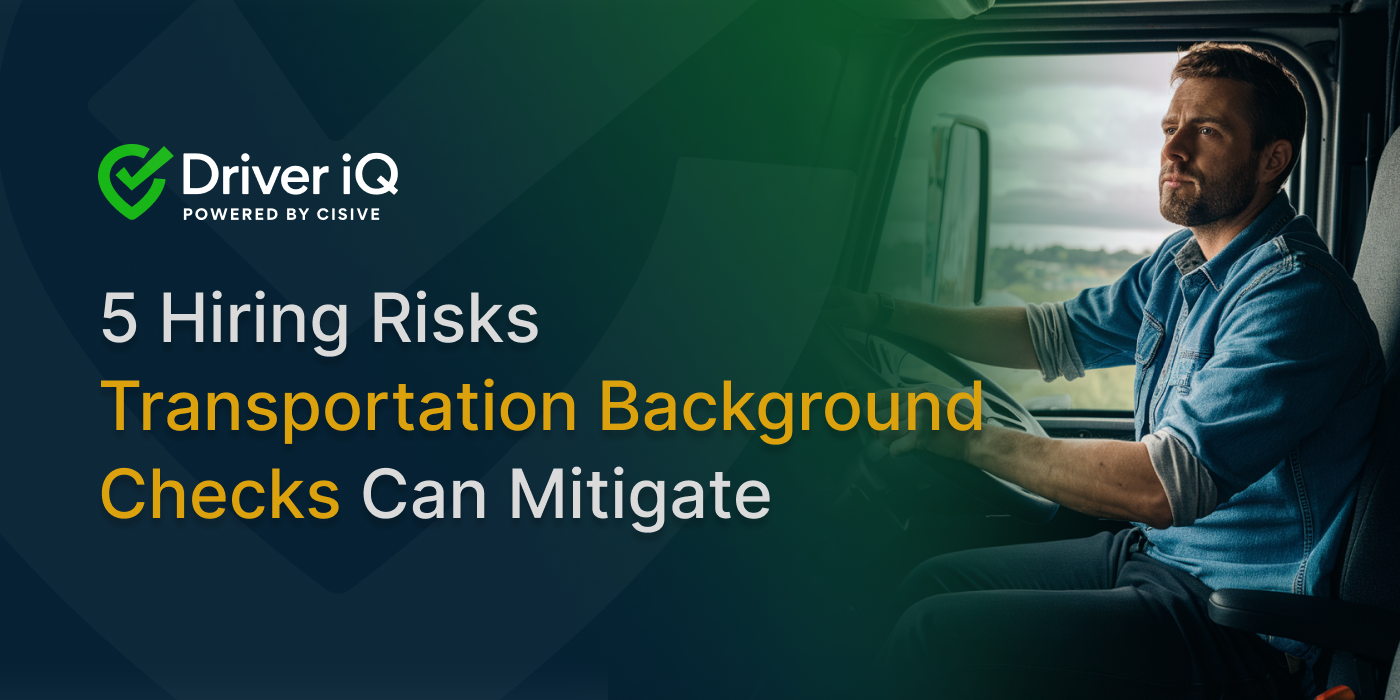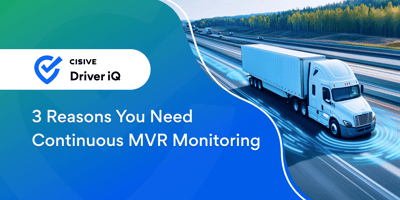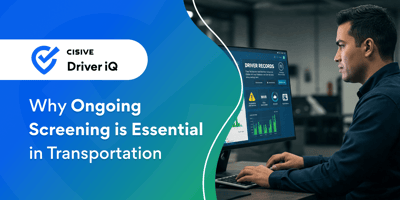

Keeping your fleet safe requires more than periodic checks. A real time MVR monitoring program...

Safety is a top priority in the transportation and trucking industry. A key tool for risk mitigation is background check procedures during the hiring process. Hiring truck drivers isn’t just about finding the right person for the job: it's about protecting everyone on the road. Background checks look into each candidate's past to predict their future behavior so you can reduce risks and create a safer environment for everyone.
Learn what motor carriers and transportation companies need to know about risk mitigation via background checks when hiring truck drivers.
Key Takeaways
|
Risk mitigation is the process of identifying, assessing, and addressing risks to your organization's operations or reputation. In human resource management, risk mitigation means preventing vulnerabilities when hiring, onboarding new hires, and managing employees. Workplace risks include fraud, data breaches, physical violence, and reputational damage.
Background checks help HR professionals identify potential risks when hiring. They uncover applicant or employee issues that could pose a threat to the organization or its stakeholders. By vetting candidates through comprehensive background screenings, companies can avoid costly hiring mistakes, lawsuits, and damage to their reputation.

The risks of making a bad hiring decision are especially high in the transportation and trucking industry. Here are some of the hiring risks that background checks address.
A background check can reveal a history of unsafe driving, including speeding, reckless driving, driving under the influence (DUIs), and other traffic violations. Employers can identify and screen out candidates with a pattern of unsafe driving behavior. Background checks help companies hire drivers who are unlikely to cause accidents, reducing a host of risks to the business.
Background checks authenticate a candidate's commercial driver's license (CDL) credentials and other required endorsements or certifications. This process ensures that all drivers have the proper training and qualifications to operate commercial vehicles, which reduces the risk of accidents due to inexperience or lack of training.
Drivers with a history of substance-use disorders pose a significant risk in the transportation industry, as they might be more likely to operate a vehicle while impaired. Background checks, including drug-testing history and criminal records related to substance use, will identify candidates who pose elevated risks. These background checks can be part of a comprehensive drug-screening program.
A candidate's history of road accidents or safety violations can be a critical indicator of future risk. Background checks that review a candidate's driving record and reports from the Department of Transportation (DOT) can identify individuals with a history of accidents or safety infractions.
Background checks help employers detect when a candidate or employee has lied about their employment history or identity. Personal identifying information, such as a candidate’s Social Security number, can verify identity and previous employment. This ensures employers only hire people who are who they say they are and possess the experience and credentials they claim to have.
By addressing these risks through comprehensive background checks, transportation companies improve safety, ensure regulatory compliance, and make more informed hiring decisions, contributing to overall operational safety and reliability.

Guaranteeing the safety and integrity of your motor carrier’s operations requires a multifaceted approach to vetting potential hires. Check out which types of background checks are pivotal for identifying the most qualified and reliable candidates.
A motor vehicle records check reveals details about driver's license status, traffic violations, DUI convictions, and accident history. This information is crucial for assessing a candidate's driving record, current licensure status, and safety history.
A commercial driver’s license information system (CDLIS) report confirms that the candidate has the valid license required for operating commercial vehicles. This check also verifies special endorsements that may be necessary for specific types of cargo or vehicles.
A pre-employment screening program (PSP) report offers access to a candidate's crash and inspection history as recorded by the Federal Motor Carrier Safety Administration (FMCSA). The PSP report helps employers evaluate a driver's safety performance and can reduce the risk of accidents.
Criminal background checks identify criminal history, including convictions, and helps employers determine a candidate's suitability for the role. This type of background check helps employers weigh potential safety and security risks that a candidate might present.
Drug and alcohol screenings check for indications of active drug or alcohol abuse, including past test results and violations of drug and alcohol regulations. This screening is essential for compliance with DOT regulations.
Employment verification processes confirm the candidate's work history, with a focus on their experience in driving roles. This helps verify the candidate's experience level and reliability, as well as detect inaccurate information.

A comprehensive background check program is a critical component of a trucking company’s safety and integrity. Take the following steps to mitigate risks when hiring.
Start by identifying the requirements and risks inherent to your industry, including risk assessments required by law. For truck drivers, this includes verifying the candidate's driving record, checking for traffic violations or DUIs, and making sure they possess the appropriate licenses (e.g., a valid CDL).
Tailor the background checks to address the unique risks of each job role. For example, you’ll run standard criminal background and employment history checks when hiring truck drivers. But you’ll also check for past traffic incidents or road accidents, confirming the candidate’s driving history with the DOT.
Stay alert to potential regulatory changes that could affect your background check process. You need to comply with relevant laws and regulations at the federal, state, and local levels. For truck drivers, this means adhering to Federal Motor Carrier Safety Administration (FMCSA) guidelines, including the requirement for a PSP report.
If using a third-party service to conduct background checks, it's essential to comply with the Fair Credit Reporting Act (FCRA). Employers must notify candidates that they’re running a background screening, obtain consent, and inform them of adverse actions based on the results. Find a background screening partner with a proven track record of compliance across federal, state, and local regulations.
When obtaining candidate consent for background checks, explain what the check entails. This transparency builds trust and ensures candidates are aware of what the process involves.
During the background check, focus on information that’s relevant to a truck driver's job responsibilities. For example, while a driving record is pertinent, credit scores might not be relevant unless the position also involves financial responsibilities.
Investing in a comprehensive background screening process fosters a culture of responsibility and trust, laying the groundwork for a safer future on the road. These thorough screenings will identify the best driver candidates while acting as a safeguard against potential risks that could affect your company's reputation and public safety.
Want more answers to your background check questions? Schedule a call with one of our background screening experts.
Author: Michael Kapuschinsky
Bio: Product Manager with more than a decade of experience in the transportation industry.
Let's Connect on LinkedIn
Keeping your fleet safe requires more than periodic checks. A real time MVR monitoring program...

You don't always know what your drivers do when they're off the clock, but those actions could...

From delivering goods to transporting essential supplies, truck drivers are the backbone of the...